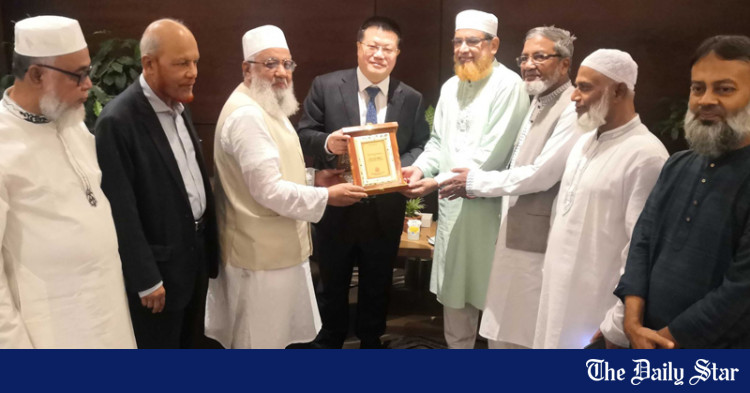Saif
Senior Member
- Joined
- Jan 24, 2024
- Messages
- 16,835
- Likes
- 8,152
- Nation

- Residence

- Axis Group


Direct maritime route to China
There is much hype about the new direct seaborne route between Bangladesh's principal port, Chattogram to Ningbo, China (via Shanghai) and Shekou ports. The excitement is understandable for bulk cargo movers (shipping lines), as it involves a route that promises to cut down lead times by at least 1
Direct maritime route to China
Syed Mansur Hashim
Published :
Sep 20, 2024 22:04
Updated :
Sep 20, 2024 22:04

MV Kota Angoon sailed from the Port of Ningbo-Zhushan, one of the world's busiest seaports of China, on September 7 and reached Chattogram in nine days using the direct route
There is much hype about the new direct seaborne route between Bangladesh's principal port, Chattogram to Ningbo, China (via Shanghai) and Shekou ports. The excitement is understandable for bulk cargo movers (shipping lines), as it involves a route that promises to cut down lead times by at least 10 days and the fact that China remains the country's largest trading partner is hardly lost upon anyone, particularly importers. What Bangladesh will do to take advantage of the recent declaration by China to accord 100 per cent duty-free access to Bangladeshi products entering that market is of course, a matter of debate, but the opening of this route is something to talk about.
According to a report published recently in the Financial Express, "The first ship on the Bangladesh-China direct route, MV Kota Angoon V Kajon, carrying 935 TEUS containers arrived at the outer anchorage of Chattogram sea port on Monday. The ship was scheduled to dock at Jetty No. 13 of Chittagong Port today (Tuesday)." Pacific International Lines (PIL) which happens to be a global container shipping company has started this route because it makes sense to have a direct line of communication between the two nations. Cargo vessels will depart from Chattogram port and sail to Chinese ports. The advantage of this route is basically two fold, reduction of lead times and cost saving both of which are essential for international sea-borne trade.
Bangladesh is heavily dependent on import of not just raw materials but also industrial products from China, which literally produces everything under the sun. By international estimates, China manufactures 70 per cent of all industrial goods and by that calculation alone, the need to have a trade link that cuts down on shipping times will affect cost of import and export. As explained by the president of the Shipping Agent Association, "The new route will enhance our trade with China. Bangladesh imports machinery and raw materials for the garment manufacturing and export sector from China, while Bangladesh's export basket includes jute yarn, hides, and processed hair... Therefore operating a direct shipping route is considered quite promising."
Bangladesh is a global leader in the world of apparels. There has been much talk about export market diversification. Even when it comes to readymade garments (RMG) exports, the bulk of apparels made in Bangladesh are concentrated heavily in two main markets, the north American continent and Europe. Yet, China boasts the largest population on the planet with a vibrant domestic market. That is why the rest of the world is so interested in setting up industrial units there to sell to the Chinese consumers. Bangladesh hasn't truly explored that market yet.
Why not? The policy focus was never there. It is not just RMG sector that has not explored the most lucrative of markets but the focus hasn't been there for any of the other sectors either. There has been some talk at policy level recently about the potential of jute, jute based products and jute yarn. Where the rest of the world is hungry for biodegradable, environmentally friendly products made from eco-friendly materials, the country sits idle on the jute issue. Countless articles have been written in media over decades about why jute is central to the Bangladesh economy, and yet successive governments have only paid lip service to its development.
Bangladeshi farmers in certain districts of the country have traditionally grown jute but the lack of market for this 'golden fibre' was never really explored by policymakers. No research and development effort, no capital infusion into turning this raw material into countless fashion items and packaging material has been done as a matter of national priority. It is sad to see that when Adamjee Jute Mills was shut down, at least 10 new jute mills came into operation in neighbouring India. The message wasn't lost upon that country's policymakers that a golden opportunity had emerged. Bangladesh would no longer be a major competitor but merely a supplier of raw material henceforth.
There is much concern that this route will not get enough cargo on the two-way traffic and it will shut down somewhere down the line. If Bangladesh is to take advantage of the duty-free situation, it needs to expand its list of exportable items to the Chinese market. Diversification of the export basket has also long been discussed but not acted upon. Perhaps the conditions are now proper to start thinking out of the box about this once number one foreign exchange earner in Bangladesh and do something that will save both livelihoods of millions of farmers and earn serious foreign exchange by way of export of its products. It is time the policymakers came up with pragmatic plan for making the most of the jute's potential. The opportunities are there and those must be grabbed with open arms.
Syed Mansur Hashim
Published :
Sep 20, 2024 22:04
Updated :
Sep 20, 2024 22:04
MV Kota Angoon sailed from the Port of Ningbo-Zhushan, one of the world's busiest seaports of China, on September 7 and reached Chattogram in nine days using the direct route
There is much hype about the new direct seaborne route between Bangladesh's principal port, Chattogram to Ningbo, China (via Shanghai) and Shekou ports. The excitement is understandable for bulk cargo movers (shipping lines), as it involves a route that promises to cut down lead times by at least 10 days and the fact that China remains the country's largest trading partner is hardly lost upon anyone, particularly importers. What Bangladesh will do to take advantage of the recent declaration by China to accord 100 per cent duty-free access to Bangladeshi products entering that market is of course, a matter of debate, but the opening of this route is something to talk about.
According to a report published recently in the Financial Express, "The first ship on the Bangladesh-China direct route, MV Kota Angoon V Kajon, carrying 935 TEUS containers arrived at the outer anchorage of Chattogram sea port on Monday. The ship was scheduled to dock at Jetty No. 13 of Chittagong Port today (Tuesday)." Pacific International Lines (PIL) which happens to be a global container shipping company has started this route because it makes sense to have a direct line of communication between the two nations. Cargo vessels will depart from Chattogram port and sail to Chinese ports. The advantage of this route is basically two fold, reduction of lead times and cost saving both of which are essential for international sea-borne trade.
Bangladesh is heavily dependent on import of not just raw materials but also industrial products from China, which literally produces everything under the sun. By international estimates, China manufactures 70 per cent of all industrial goods and by that calculation alone, the need to have a trade link that cuts down on shipping times will affect cost of import and export. As explained by the president of the Shipping Agent Association, "The new route will enhance our trade with China. Bangladesh imports machinery and raw materials for the garment manufacturing and export sector from China, while Bangladesh's export basket includes jute yarn, hides, and processed hair... Therefore operating a direct shipping route is considered quite promising."
Bangladesh is a global leader in the world of apparels. There has been much talk about export market diversification. Even when it comes to readymade garments (RMG) exports, the bulk of apparels made in Bangladesh are concentrated heavily in two main markets, the north American continent and Europe. Yet, China boasts the largest population on the planet with a vibrant domestic market. That is why the rest of the world is so interested in setting up industrial units there to sell to the Chinese consumers. Bangladesh hasn't truly explored that market yet.
Why not? The policy focus was never there. It is not just RMG sector that has not explored the most lucrative of markets but the focus hasn't been there for any of the other sectors either. There has been some talk at policy level recently about the potential of jute, jute based products and jute yarn. Where the rest of the world is hungry for biodegradable, environmentally friendly products made from eco-friendly materials, the country sits idle on the jute issue. Countless articles have been written in media over decades about why jute is central to the Bangladesh economy, and yet successive governments have only paid lip service to its development.
Bangladeshi farmers in certain districts of the country have traditionally grown jute but the lack of market for this 'golden fibre' was never really explored by policymakers. No research and development effort, no capital infusion into turning this raw material into countless fashion items and packaging material has been done as a matter of national priority. It is sad to see that when Adamjee Jute Mills was shut down, at least 10 new jute mills came into operation in neighbouring India. The message wasn't lost upon that country's policymakers that a golden opportunity had emerged. Bangladesh would no longer be a major competitor but merely a supplier of raw material henceforth.
There is much concern that this route will not get enough cargo on the two-way traffic and it will shut down somewhere down the line. If Bangladesh is to take advantage of the duty-free situation, it needs to expand its list of exportable items to the Chinese market. Diversification of the export basket has also long been discussed but not acted upon. Perhaps the conditions are now proper to start thinking out of the box about this once number one foreign exchange earner in Bangladesh and do something that will save both livelihoods of millions of farmers and earn serious foreign exchange by way of export of its products. It is time the policymakers came up with pragmatic plan for making the most of the jute's potential. The opportunities are there and those must be grabbed with open arms.




